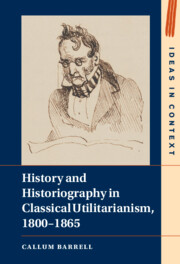Book contents
- History and Historiography in Classical Utilitarianism, 1800–1865
- Ideas in Context
- History and Historiography in Classical Utilitarianism, 1800–1865
- Copyright page
- Dedication
- Epigraph
- Contents
- Acknowledgements
- Conventions
- Introduction
- Part I Enlightened Historicisms
- Part II Historicism and Historiography
- Part III Sciences of History
- Chapter 5 J. S. Mill and Historical Relativism
- Chapter 6 J. S. Mill on Universal History
- Conclusion
- Bibliography
- Index
Chapter 5 - J. S. Mill and Historical Relativism
from Part III - Sciences of History
Published online by Cambridge University Press: 24 September 2021
- History and Historiography in Classical Utilitarianism, 1800–1865
- Ideas in Context
- History and Historiography in Classical Utilitarianism, 1800–1865
- Copyright page
- Dedication
- Epigraph
- Contents
- Acknowledgements
- Conventions
- Introduction
- Part I Enlightened Historicisms
- Part II Historicism and Historiography
- Part III Sciences of History
- Chapter 5 J. S. Mill and Historical Relativism
- Chapter 6 J. S. Mill on Universal History
- Conclusion
- Bibliography
- Index
Summary
J. S. Mill’s protest at ‘vulgar’ uses of the past gave way in the 1830s to an eclectic science of history which drew on Samuel Taylor Coleridge, the Saint-Simonians, and Auguste Comte. Book VI of A System of Logic (1843) sketched a theoretical outline of progress whose scientific conversion came about when it was connected, indirectly, to the ultimate laws of psychology. The triumph of sociology reflected Mill’s settled view that society was increasingly a historical phenomenon, shaped less and less by the psychological laws from which Thomas Hobbes, Bentham, and the ‘geometric’ reasoners had deduced their political ideas. This realisation, Barrell argues, pulled in two directions. While it provided a logic and vocabulary of historical relativism, its theoretical sketch of progress was neither relative nor concretely historical because it encompassed the ‘whole previous history of humanity’ as a progressive chain of causes and effects. This double consciousness, I have argued, can be profitably situated within German historicism, French science sociale, and English utilitarianism, all of which acknowledged the logical dissonance between historical facts and their theoretical reconstruction.
Keywords
- Type
- Chapter
- Information
- Publisher: Cambridge University PressPrint publication year: 2021

